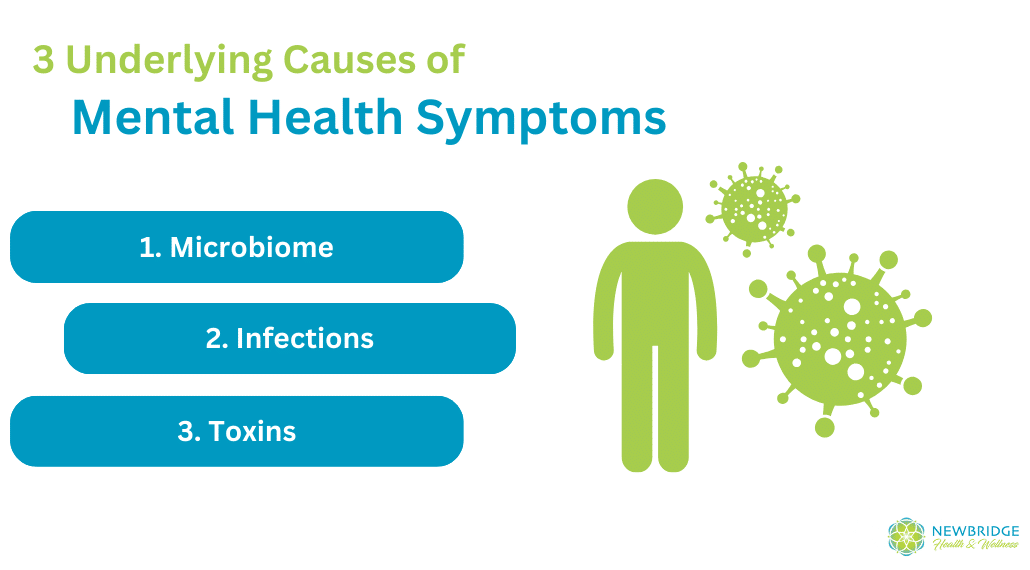Mental health issues affect millions of people worldwide, and while there have been significant advancements in understanding and treating these conditions, many individuals continue to struggle. The causes of conditions like depression, anxiety, ADHD, mood swings, and others are multi-layered. And yet, patients are often given the impression that their symptoms should be seen through the lens of something singular, like a serotonin deficiency or an emotional trauma, and that one treatment approach – medication, such as an antidepressant – is the best option. Yet, as research expands and functional medicine plays a larger part in the evaluation and treatment of mental health issues, it’s clear that conditions “of the brain” are often actually “of the body,” meaning there could be many physiological factors at play which go beyond neurotransmitter imbalances. This is why a root-cause approach is an important one to consider for any individual who suffers from ongoing mental health symptoms. In other words, it’s not always as simple as seeing a doctor and being treated with something like an SSRI to boost serotonin.
Want to understand the causes of your or your child’s depression, anxiety, ADHD, or other mental health issues? Schedule a 15 minute complimentary intake consultation to get started.
Connecting the dots in mental health
Functional medicine is often seen as an approach only used in physical illnesses such as autoimmune disorders, hormonal imbalances, or GI conditions. Yet, it has (or should have) a place in the treatment of mental health conditions too. Mental health and physical health are intricately connected, and perhaps surprisingly, underlying conditions such as imbalances in the GI system, infections, and toxins can be major contributing factors in a person’s mental health profile. Here we explore all three, giving way to the importance of viewing mental health issues – and the people who suffer from them – with a wide lens.

- The microbiome and mental health: In the realm of mental health, there’s an increasing focus on research into the intricate relationship between our gut microbiome (the bacteria that live in the GI tract) and our psychological well-being – a connection often overlooked in conventional medicine discourse. While your doctor or psychiatrist may not have explicitly mentioned it, the microbiome produces many important vitamins and enzymes our bodies need to function properly, both in a physical and mental capacity.
To begin, disruptions in the delicate balance of gut bacteria can lead to inflammation within the body, including the brain. This inflammation has been linked to various mental health disorders such as depression and anxiety. Next, the microbiome produces a plethora of neurotransmitters, including serotonin and dopamine, crucial for regulating mood and behavior. Any imbalance in these neurotransmitters due to a compromised gut flora can contribute to mood disorders. Finally, it’s crucial to consider the gut-brain axis, which represents the communication network connecting the gut and the brain. The axis facilitates the exchange of signaling molecules and immune system messengers, allowing for bidirectional communication. When this communication system is disrupted, it can profoundly affect mood, cognitive function, and responses to stress, all of which are integral to mental health. - Infections and mental health: When we think of infections, we usually associate them with acute physical symptoms like fever, cough, or body aches. However, infections can also have a profound impact on our mental health. One prime example is Lyme disease, a tick-borne illness caused by the bacterium Borrelia burgdorferi.
- Anxiety
- Depression
- Brain Fog
- Mood swings
- Cognitive impairment
- Even suicidal thoughts
Lyme is misdiagnosed as a purely psychiatric disorder. This can be true in both adult and pediatric cases of Lyme, and missing such an infection in a patient can have long term and lasting impacts on a patient.
Another important example is the presence of viruses. Viruses can be acute and actively causing symptoms, or may have been dormant in our bodies for years, but suddenly reactivated a person’s mental health without them or their doctors realizing it. Although the exact mechanisms are not fully understood, it is becoming increasingly clear that certain viruses may play a role in the development of mental health disorders. Such viruses include herpes simplex virus (HSV), Epstein-Barr virus (EBV) and cytomegalovirus (CMV). HSV is responsible for cold sores and can cause encephalitis, a condition where the virus infects the brain. Encephalitis can lead to mood swings, psychosis, and cognitive deficits. In some cases, the association between HSV and mental health issues may go unnoticed. Chronic infections like EBV and CMV can both contribute to persistent fatigue, mood disturbances, and neurological/nervous system disorder. Researchers are exploring the link between viral infections and conditions like schizophrenia, as well.
- Toxins and mental health: Toxins in our environment can contribute to changes in our mental health. Some include:
- Heavy metals like lead, mercury, and cadmium are known neurotoxins that can affect brain function. Exposure to these substances, often through contaminated food, water, or occupational hazards, can lead to cognitive impairments and mood disorders.
- Mold can also be a common factor in mental health because exposure to it may lead to what’s known as Mold Biotoxin Illness, otherwise known as Chronic Inflammatory Response Syndrome (CIRS). This condition can develop after someone is exposed to contaminated indoor air, food, or water, and sometimes it can even arise from insect bites. Water damaged buildings are notorious for unknowingly exposing people to biotoxins.
Once someone becomes ill, removal of the toxins like mold, heavy metals, and pollutants from the body is often key for improving both physical and mental health/cognitive symptoms, and can require extensive courses of treatment depending on the level of exposure.
Digging deeper for better diagnostics
The microbiome, infections, and toxins are three often overlooked root causes of mental health issues that your doctor or psychiatrist may not be examining. But understanding the potential connections between these factors and mental health can open up new avenues for diagnosis and treatment. If you or someone you know is struggling with mental health symptoms that seem resistant to conventional treatments, it may be worth exploring further. A holistic approach that considers the potential role of your gut health, infections/viruses, and toxins in your mental health can provide a more comprehensive understanding of symptoms and issues, and lead to more effective interventions.
Find out if your microbiome, infections, or toxins may be playing a part in your mental health symptoms. Schedule a call with our Intake Coordinator to learn more about our providers and treatment strategies.


